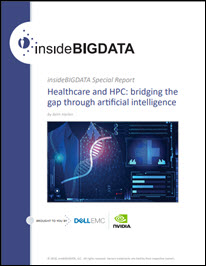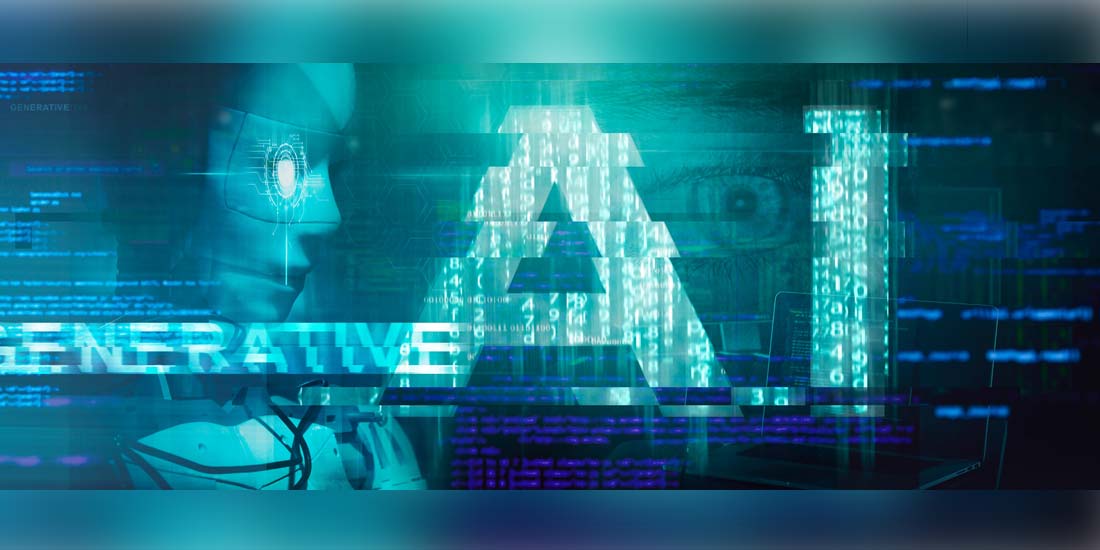This insideAI News special report series explores the intersection of AI and healthcare. This entry highlights some of the latest developments in AI in medicine, including progress in radiology and genomics.

Download the full report.
Radiology study
Next-generation radiology tools may remove the need for tissue sampling and greatly expand the area of delivery. Lucas A. “Luke” Wilson is a data scientist and artificial intelligence researcher in the Dell EMC HPC and AI engineering group, focusing on developing hardware configurations and software solutions for deep learning problems. He has been involved in the development of models for using AI to diagnose pneumonia, emphysema and other thoracic pathologies from chest X-rays, using the Stanford University CheXNet model.
Commenting on a recent project at the Dell EMC HPC and AI Innovation Lab to train an AI radiologist, Wilson highlighted that, “In the last five to six years, we have reached the point where we have enough computational power to really think about processing images in this way.
“We have shifted to where we are allowing a computer to learn a set of features it thinks is important, instead of us telling it what we think is important.
“This is new ground for everyone. We can train an AI radiologist model with specialized skills, replicate that model 100 times over, and even shrink it down to where it can work on a cell phone or low-powered PC. This enables patients to get specialized predictions and opinions in areas where a trained radiologist might not easily get to.” Wilson added that in locations where physicians have access to an X-ray but not necessarily a radiologist, the algorithm can help provide triage and guidance on what course of action to take. “In the end,” he continued, “anything that involves making a subjective decision will always involve a human doctor, but AI can augment that with specialist capabilities. Those capabilities can be deployed where access to specialized care is difficult or impossible.”
Center for Rare Childhood Disorders TGen discovery
Key results:
- Accelerated genetic analysis
- One million CPU hours supported monthly
- Custom treatments developed one week faster
- PYCR2 gene mutation identified
- New hope given to families suffering from symptoms related to the mutation
Translational Genomics Research Institute’s (TGen) Center for Rare Childhood Disorders sought to discover gene mutations by using a faster, more powerful technology platform for genetic sequencing. Every day, TGen bioinformaticians, geneticists and clinicians perform genetic sequencing in an effort to identify diseases and help more people survive them. For accurate diagnoses, high-performance computing systems capable of quickly running complex algorithms that analyze multiple terabytes of genetic and molecular data on a patient are needed.

Translational Genomics Research Institute’s (TGen) Center for Rare Childhood Disorders sought to discover gene mutations by using a faster, more powerful technology platform for genetic sequencing. (Shutterstock/successfulalexey78)
TGen implemented an HPC cluster based on the Dell EMC Genomic Data Analysis Platform. The cluster includes 96 Dell EMC PowerEdge M420 server blades, contained in three Dell EMC PowerEdge M1000e chassis, delivering 512 cores in 10U. The Center also relies on Dell EMC Networking S4810 switches at the top of the rack to facilitate cluster component communication.
Utilizing its Dell EMC HPC cluster, in 2016, a team of TGen researchers led by Drs. Matt Huentelman and Vinodh Narayanan collected genetic sequencing data from the Pais family and were able to diagnose the daughter with a mutation in the PYCR2 gene. This offered hope to family that had struggled for 18 years to find answers for their daughter’s ill health. This diagnosis occurred after a paper in the American Journal of Human Genetics had been published by researchers at Boston Children’s Hospital on children with the same disorder. The team at TGen has since collaborated with the group at Boston Children’s Hospital by sharing bio-specimens in order to gain insight into this rare disorder.
Potential growth
For existing patients, clinically relevant information could be unlocked through the application of AI to examine electronic medical records. Through sophisticated analytics, models can be developed to predict the best course of action when treating future patients with similar symptoms or condition. Then there is administrative aid— from speeding up workflows with voice-to-text transcriptions to the provision of virtual nursing assistants who can be on call to answer patient questions 24×7.
Preventative medicine benefits from AI. Wearable, AI-enabled devices can gather data that is then modeled, offering insight into both individual and population health.
Mobility and access to care is another potential area of growth. By deploying AI imaging tools through an application on a mobile device, for example, physicians in remote or rural areas can have access to expert diagnostic support. As the quality of cameras on mobile devices improves, the fields of dermatology and ophthalmology are on track to benefit from the ability for physicians to take a photo that can then be quickly analyzed by AI image recognition models.
Diagnostic medicine is one of the first domains to benefit from AI, however, additional areas within the healthcare chain also benefit. Preventative medicine is one example. Wearable, AI-enabled devices can gather data that is then modeled, offering insight into both individual and population health. By offering proactive guidance and management of a healthy lifestyle, AI can encourage behavior—such as greater activity levels—that can reduce future medical needs.
Interested in learning more about AI in medicine and healthcare? This insideAI News special report series will also cover the following aspects of AI in the healthcare industry over the next few weeks:
- Applications of AI within Healthcare
- Further results of the use of AI in healthcare, including:
- Vision research
- Cancer treatment
- Finding an AI solution
- What’s next?
Download the full insideAI News special report, “Healthcare and HPC — Bridging the Gap Through Artificial Intelligence,” courtesy of Dell EMC and NVIDIA, to learn more about how AI is impacting the healthcare industry.




Speak Your Mind